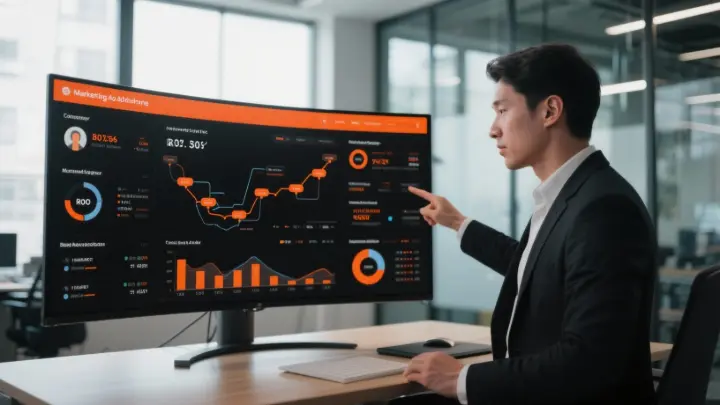Customer acquisition costs have surged by 222% in the last 8 years, creating a financial crisis for businesses across all industries. The combined average customer acquisition cost across 10 major industries is now $606, with some sectors like fintech facing even steeper expenses. Traditional marketing methods are struggling to provide acceptable returns, forcing businesses to seek innovative solutions.
Artificial intelligence has emerged as the game-changing solution. Companies using AI for customer acquisition have witnessed up to a 50% reduction in acquisition costs while improving conversion rates and customer experience. AI eliminates guesswork by processing vast amounts of data, identifying patterns, and making real-time decisions that optimize every aspect of the customer acquisition process.
Target the Right Customers with AI Predictive Analytics
Traditional advertising wastes money by showing ads to people who will never become customers. Predictive analytics powered by AI changes this by analyzing behavior patterns, demographics, and purchase intent to identify who is most likely to convert. 74% of marketers using AI for segmentation saw improvements in conversion rates because they stopped relying on assumptions and started using data.
AI examines hundreds of data points including browsing behavior, social media engagement, purchase history, device usage patterns, and micro-interactions like scroll speed. This comprehensive analysis creates detailed profiles that reveal not just who might buy, but when they are most likely to purchase and what messaging will resonate most effectively.

The system continuously learns from campaign performance and adjusts targeting in real-time. If people who engage on Tuesday evenings convert more, it automatically adjusts ad scheduling. If certain regions show higher conversion rates, budget allocation shifts accordingly. This dynamic optimization ensures every advertising dollar works efficiently while focusing on prospects most likely to become valuable, long-term customers.
Automate Your Marketing and Sales with AI Workflows
Manual marketing and sales processes consume enormous resources while creating delays in the sales cycle. 80% of businesses are expected to adopt AI and machine learning technologies by 2025, driven by efficiency gains these systems provide.
When a potential customer downloads content or signs up for a webinar, AI workflows analyze the prospect's behavior, score their likelihood to convert, and determine the optimal next step. High-scoring leads receive immediate phone calls or meeting invitations, while lower-scoring prospects enter carefully crafted email sequences designed to build trust over time.
The personalization goes beyond inserting names into emails. AI customizes entire communication strategies based on individual preferences. Video content lovers receive video-based follow-ups, while prospects preferring detailed information get comprehensive guides and case studies. Timing, frequency, and channels all adjust automatically based on what will be most effective for each prospect.
Lead qualification becomes dramatically more efficient as AI systems engage with leads through chatbots and interactive content before passing only qualified prospects to human sales representatives. Campaign management also becomes automated, with AI creating, testing, and optimizing ad campaigns across multiple platforms simultaneously.

Scale Lead Qualification with AI Voice Calling
Cold calling remains expensive and inefficient, with only 2% of calls typically resulting in qualified appointments. Customer acquisition costs for fintech companies using AI dropped 41% when they implemented AI voice technologies for lead qualification.
Modern AI voice agents sound natural and handle complex conversations beyond simple scripted responses. They understand context, ask follow-up questions, handle objections, and demonstrate emotional intelligence by adjusting tone based on prospect responses. Many prospects cannot distinguish between AI agents and human representatives during initial calls.
The scalability is transformative. While human representatives make 50-100 calls daily, AI systems engage thousands of prospects simultaneously without fatigue or performance variation. Every conversation gets recorded, transcribed, and analyzed for insights, continuously improving performance while providing valuable data for broader sales strategies.
AI calling agents access customer history and previous interactions before making contact, enabling personalized conversations that reference downloads, website visits, or engagement signals. This preparation creates more relevant and compelling conversations right from initial outreach.

Create Personalized Content at Scale with AI
Generic marketing messages no longer capture attention in today's oversaturated landscape. Centralizing CRM data with AI tools allows for dynamic personalization, potentially boosting conversions by 20-30%. This improvement directly reduces customer acquisition costs by maximizing value from every marketing interaction.
AI analyzes customer behavior patterns, purchase history, engagement preferences, and demographics to create completely customized experiences. Dynamic creative optimization continuously tests and refines elements in real-time, generating hundreds of variations and automatically serving the most effective versions to different segments.
Content generation spans multiple formats including personalized email sequences, social media posts, ad copy, product descriptions, and video scripts tailored to specific audiences. Behavioral triggers enable real-time personalization that responds to customer actions as they happen, creating seamless experiences that feel natural rather than invasive.

Track What Works with AI Marketing Attribution
Misallocation of marketing budgets significantly contributes to rising acquisition costs. Companies leveraging AI in marketing see 20-30% higher ROI on campaigns compared to traditional methods because they have accurate data about what works.
AI attribution systems track every interaction across all channels, using advanced algorithms to determine the true contribution of each touchpoint to final conversions. They account for interaction sequences, timing between touchpoints, specific content consumed, and external factors that influence purchase decisions.
Budget optimization becomes data-driven rather than based on gut feelings. AI continuously analyzes performance across channels, campaigns, and tactics, automatically shifting budget toward the most effective options. This happens at granular levels impossible for human marketers to manage, optimizing bidding strategies for individual keywords and adjusting targeting based on real-time performance data.
Cross-channel insights reveal opportunities that might otherwise go unnoticed, enabling coordinated campaigns that leverage multiple channels strategically while calculating true customer lifetime value by channel for more strategic acquisition investments.
Start Your AI Journey Today
The competitive advantage from AI adoption continues to grow as technology becomes more sophisticated. Early adopters already see significant advantages in customer acquisition efficiency, and the gap between AI-enabled companies and traditional approaches will likely continue widening.

AI-optimized digital ad spending is expected to reach $120 billion globally by 2024, indicating massive investment in AI-powered marketing technologies. 68% of marketers report positive ROI from investing in AI and automation tools, but success requires strategic implementation and careful monitoring.
The key lies in starting with focused implementations addressing specific customer acquisition challenges, then expanding AI usage as teams develop expertise. Companies trying comprehensive AI strategies all at once often struggle with complexity. A phased approach beginning with high-impact applications provides better results and builds organizational capability.
Customer acquisition will continue becoming more competitive and expensive for businesses relying on traditional methods. AI provides a path to more efficient, effective customer acquisition that delivers better results at lower costs. The question is not whether to implement AI, but how quickly businesses can develop effective strategies before competitors gain insurmountable advantages.
The businesses that thrive will be those successfully harnessing AI to create efficient customer acquisition processes, deliver better customer experiences, and build stronger relationships with target audiences. The technology exists today to achieve these benefits, and competitive pressure to adopt AI will only increase as more businesses discover its transformative potential.